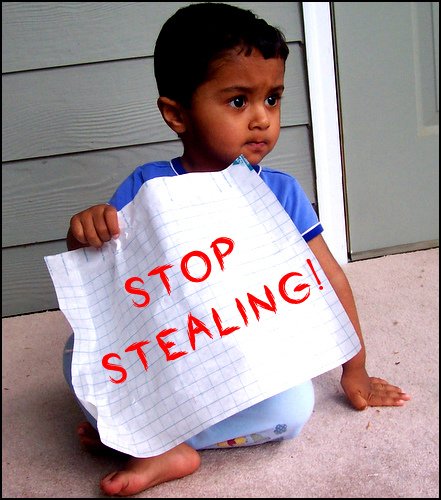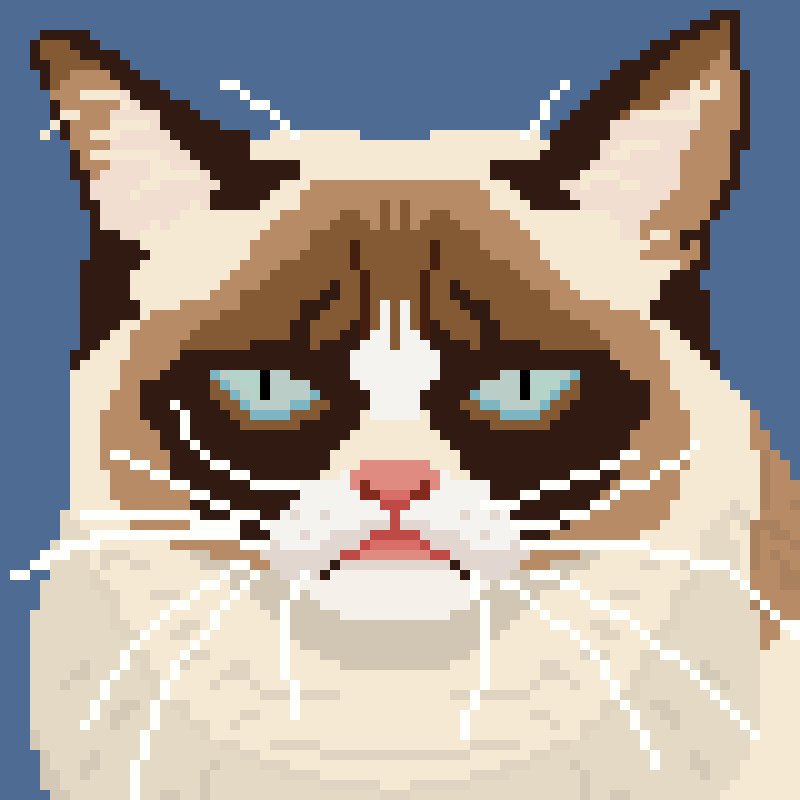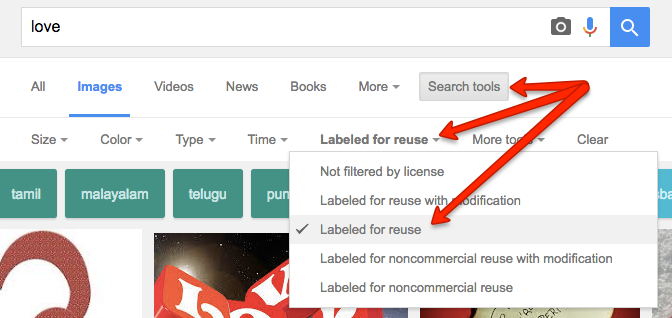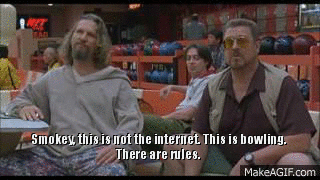One of my favorite @larkenrose videos is But What Will Be Done About...? where he asks what you will do to prevent abusive behavior in a society without a ruling class.
Spoiler Alert: Steemit Has No Ruling Class.
And no, I'm not going to count someone's ability to upvote or flag your post as a valid comparison to violent, psychopathic parasites we have in government today.
The Statist society we live in has defined numerous "crimes" which we'll have to form opinions on as we work to imagine and build our own voluntary society. Most Voluntaryists agree, if there is no victim, there is no crime. Saying "Plagiarism is wrong because the government said so" is already a dead argument. What I want to discuss here is whether or not there is a victim when it comes to one person copying and distributing the creative work of another person.

Image Credit: Nisha A, Creative Commons 2.0
Essentially, can I steal something from you if, after my action, you still have it?
I'm not strictly talking about intellectual property here.
in·tel·lec·tu·al prop·er·ty
noun
a work or invention that is the result of creativity, such as a manuscript or a design, to which one has rights and for which one may apply for a patent, copyright, trademark, etc.
For me, intellectual property already fails as a concept because it relies on "rights" and the current legal system in terms of patents, copyrights, and trademarks. These archaic government constructs stifle innovation, creating unnatural monopolies backed by violent force and the threat of imprisonment.
I haven't read Stephan Kinsella's Against Intellectual Property or Boldrin & Levine's Against Intellectual Monopoly, but my friend @tonydreher wrote an extensive review of these works in a three part post in the Nashville Liberty on the Rocks Facebook group. He got me thinking about my values concerning the protection of original ideas and creative works, along with the authors who come up with them.
Here's a gem Tony pulled from Boldrin & Levine:
Summing up: careful statistical analyses of the 19th century’s available data, carried out by distinguished economic historians, uniformly shows two things. Patents neither increase the rate of innovation, nor are the best instrument to maximizes inventors’ revenue. Patents create a market in patents and in the legal and technical services required to trade and enforce them.
Basically, patents are B.S. As a software engineer who uses open source software on a daily basis and is working to move my company to a more open source approach, I often roll my eyes and sigh when people ask me, "So, have you thought about patenting your software?"
Since 2007, we've had one of the most innovative shopping cart experiences, including single page login, signup, and checkout. Years later, we've seen other companies trying to patent similar approaches to what we already created. It's frustrating to think some day we might have to use the State to protect ourselves from those who would use the State against us regarding our own creative work.
But I digress... The point is, I've always been a fan of innovate or die. Keep creating something new and don't worry about someone copying your ideas because by then, you'll already be on to the next big thing, and they'll be left in the dust.
This sounds reasonable concerning software, but what about creative works of art? What about music, digital art, photography, an essay, novel, or scientific paper?
Do we care about plagiarism?
pla·gia·rism
noun
the practice of taking someone else's work or ideas and passing them off as one's own.
Again, there's no mommy or daddy government here to enforce someone's version of the rules. It's up to us to determine community standards and appropriate steps we, as individuals, can and should take to enforce our personal views on what will prevent harm to the network.
Since joining Steemit, my wife and I have found ourselves helping out efforts led by individuals like @anyx to fight plagiarism, fair-use violations, and identity theft through finding and exposing fraudulant activity. You can learn more about @anyx's effforts and @cheetah bot here and why some of this matters (even if you are personally fine with copying others' digital work). The existential risk created for the entire network is real if we, as a community and as individuals, ignore the creative "rights" authors enjoy elsewhere.
Does respecting "fair use" matter?
fair use
noun
(in US copyright law) the doctrine that brief excerpts of copyright material may, under certain circumstances, be quoted verbatim for purposes such as criticism, news reporting, teaching, and research, without the need for permission from or payment to the copyright holder.
Again, I'm not too concerned about US law regarding the future we want to build, other than the existential risk ignoring it creates for us all right now. I want to touch more on the reasons behind copyright law is it relates to game theory and tribalism. What really matters is trust and avoiding fraud. More on that later.
Let's bring this home with some examples.
Dan Larimer, along with other whales, have, on occasion, been accused of upvoting plagiarized content, much to the chagrin of the #steemitabuse-classic chat channel. Recently he posted an article which originally had a screen grab of a preview of a copyrighted image. He was called out about it in the comments and ended up changing the image to one from Wikimedia Commons. I wonder if he did it on purpose to see how the community would respond. Maybe he's looking for the same answers I am and wanted to know, "Do people care?"
It seems Steemit, Inc does care about creative ownership of digital content and protecting the original authors. From their license we see things like this in an effort to protect themselves from others duplicating their work, changing it, and using it to compete with them:
5.. The software is not used with any forks of the Steem blockchain that are not recognized by Steemit, Inc in writing.
To what extent should the founders of this platform influence us? If they care about protecting original authors, should we follow their lead?
What if you work really hard on a great post you're proud of and publish it with the thrill that little blue Post button gives you. Moments later, you see a huge Steem Powered account publish an exact copy of your post and watch it get upvoted to huge rewards as yours goes unnoticed. Was something taken from you? Are you a victim? Why?

Image Credit: Topher McCulloch, Creative Commons 2.0
Let's say you're working on a post and need some kick-ass images for it. Sure you could read this post by @repholder and go with paid services like Shutterstock, iStock or BigStock, or you could go cheap (like me) and use images from Wikimedia Commons, FreePik, or Pixabay. But maybe Google image search is easier and you don't bother to set the appropriate license filter. You find some stuff and go with it, not bothering to figure out who the original author is or give them credit. I think we've all done this at some point (/me raises his hand). But let's throw in an added twist. The image you end up using is actually the original work of your boss' wife. And she's pissed. Does it matter now?
Do we think differently when it involves people we know or when it involves us directly?
Is the use of other peoples' work without their permission only a problem if they find out about it and feel victimized?
This is where the philosophical veil of ignorance may come in handy. If the situation were reversed, would most people in today's culture be okay with having their hard work copied with a click and used without them getting anything for it?
Side note: you can use Google image search to find images licensed for reuse:

If it's under Creative Commons 2.0, be sure to cite the author and link to the license.
Now, I think, we're beginning to zero in on the point I want to make.
We all want to be recognized for our unique contributions.
This is very important to us as tribal beings. We want others to know we matter and we have value to offer them. If our work isn't attributed to us, we lose the honor and prestige we might otherwise have enjoyed which leads to further benefits including important relationships, opportunities, and financial rewards.
I'm currently reading The Origins of Virtue by Matt Ridley (thanks for the suggestion @cwage!) which touches on game theory and highlights how important it is to signal to the network, "I'm a cooperative agent. Other cooperative actors should work with me so we can all benefit." Cooperative strategies in repeated Prisoner's Dilemma scenarios always outperform every other approach, especially when they group up with other cooperative strategies. Fraud destroys trust and future cooperation. This alone might be reason enough to take the original content of others seriously and work to protect it. If you don't highlight the value others contribute to the network, there is no reason for them to highlight your contributions.
The battle against plagiarism is only going to get more intense in a free society. Some will be offended. Some will go on witch hunts. Some will be confused why people care about property at all.
It's up to us to have these discussions now, while the network is small enough to do so, and give some guidance to the individuals who will be taking up this fight. There is no authority here but the one we create and voluntarily agree to (i.e. leadership, not authority).
After all, this is not the Internet. This is the blockchain. There are... rules?

Image Credit: Michael Luciano (license ?)
So, what do you think? Is Michael Luciano a victim because I used that gif without knowing its license?
Do you now care about plagiarism and fair use? If so, what are you willing to do about it?
If you enjoyed this, here are some other posts of mine which touch on related topics:

